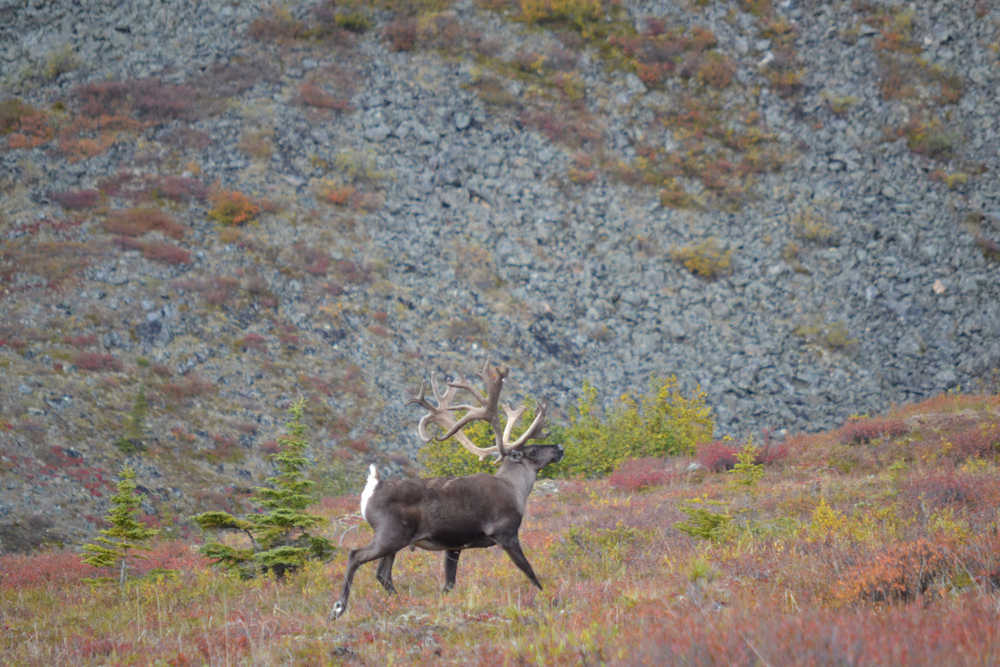Years ago, while camped alone on a ridge in the White Mountains, I crouched over a boiling pot of ptarmigan soup. It was late September. The ptarmigan had turned white, willows glowed red, orange and yellow and ridges and tussocks were frosted with ice. It was the most beautiful time of the year in the Interior, and a stark reminder winter was coming soon.
Suddenly—perhaps because I was distracted by the roar of my camp stove or the gnaw of my hunger—I sensed that a large presence had snuck up and was watching me. My thoughts flashed to the fresh tracks of a grizzly I’d stumbled onto on a game trail in the brush earlier that day. Slowly, I looked up. A young bull caribou stood just yards away.
The caribou and I studied each other for a half minute before it limped down a shale-covered slope, utilizing trails etched into the mountain by other caribou, Dall sheep and wolves. The sun set behind the Crazy Mountains, a series of hills rising out of the monotony of the taiga to the north, as I drank broth and felt the energy of the earthy-tasting flesh transfer into me.
Two days later, while walking across an expanse of tussocks, a caribou appeared on the tundra’s horizon. It ran towards me, its gangly gait arrested by a slight limp, until it was 20 feet away. The animal appeared to be the young bull from two evenings before, that or his doppelganger. It looked at me for a few moments and, then, began browsing lichens and willows.
I scanned the area for wolves and bears before looking back to the caribou. I yelled. Failing to have any effect, I flung handfuls of earth at the young bull. He took a few steps away and looked at me with confusion. I yelled, “I’m a man! You’re a caribou! You need to fear me!” and then walked rapidly away. A few moments later, the caribou caught up and paralleled me and kept pace as I trudged on.
An hour later a dozen caribou appeared about 300 yards away. My unexpected traveling partner had yet to leave my side,
“Look there,” I said, gesturing at the small herd. “Caribou. Your friends.”
One bull was quite large, his naked antlers towering well over three feet above his head. I dropped my pack at the edge of a small pool and began the slow process of filtering drinking water. The young caribou walked to the other side of the pool and began grazing just 10 feet away.
“Caribou, over there,” I said again and pointed. He looked at me, confused, before going back to eating. I ate a granola bar, which did little to satiate my hunger. I did not have much food and still had a long way to go. For a few moments, I fantasized about killing him, and how delicious he’d taste roasted over a fire. It was so bad I began to drool.
“I’m sorry,” I told him. “You’re the only friend I have.” He looked at me. My voice and the stupidity of my words felt so alien I didn’t speak again for days. I ate another granola bar and we traveled on together.
Hours later, in the deep evening, he began wandering farther away. On occasions he disappeared behind a knoll or hill for a few minutes and, then, came running back. Shortly before I stopped to make camp, inspired by the blood red orb of the sun creeping low on the horizon, he vanished into the gloomy tundra.
A flock of 50 or so shimmering white ptarmigan flew overhead and landed a few hundred yards away. It was my first chance of the day to fill my cook pot, so I made a stalk and killed two. The fading warmth of their bodies temporarily eased the cold in my hands. Another large flock flew past, the sound of their wings momentarily breaking the heavy silence. I removed only the intestines and feathers, boiling the rest of the birds as the sun disappeared behind the mountains. Storm clouds told of a blizzard that would soon come. I scanned the tundra until dark, hoping the caribou would reappear.
• Bjorn Dihle is a writer based out of Juneau. He’s working on his first book, “Haunted Inside Passage,” and can be reached at bjorndihle@yahoo.com.

